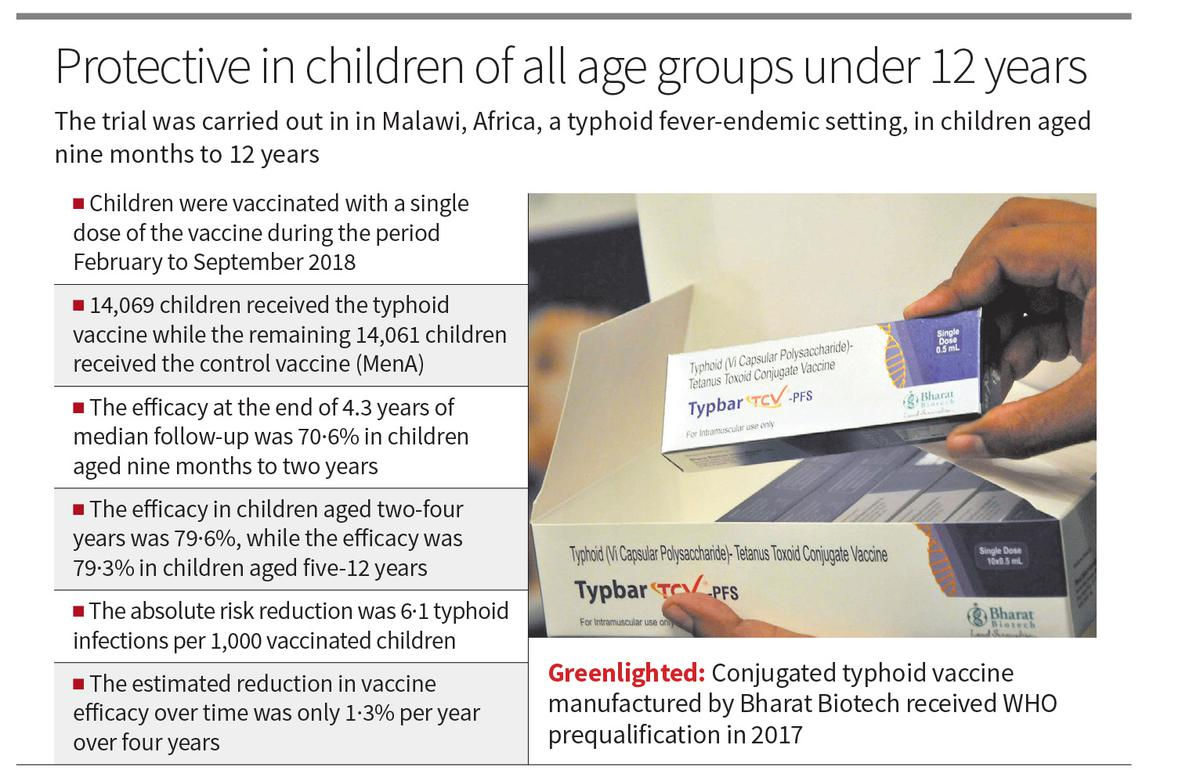Important Facts For Prelims
Typbar Typhoid Vaccine
- 09 Feb 2024
- 4 min read
Why in News?
Recently, phase-3 trial conducted in Malawi, Africa, a region endemic for typhoid fever, has demonstrated the long-term efficacy of Bharat Biotech’s Typhoid conjugate vaccine (TCV), Typbar. The efficacy of the vaccine was seen in children of all age groups studied.
- Typbar TCV is the world's first clinically proven conjugate Typhoid vaccine.
Note:
- A conjugate vaccine is a type of vaccine that combines a weak antigen with a strong antigen, also known as a carrier protein. This combination helps the immune system to develop a stronger and more effective immune response to the weak antigen.
- This stronger immune response helps to protect against infection from the pathogen that the weak antigen originated from.
What are the Major Findings of the Typbar Vaccine Trials?
What is Typhoid?
- About: Typhoid fever is a life-threatening infection caused by the bacterium Salmonella Typhi. It is usually spread through contaminated food or water.
- It is transmitted by the faecal-oral route, through ingestion of contaminated food or water.
- Once the bacteria is ingested, it multiplies and spreads into the bloodstream.
- Urbanisation and climate change have the potential to increase the global burden of typhoid.
- It is transmitted by the faecal-oral route, through ingestion of contaminated food or water.
- Symptoms: It encompasses fever, fatigue, gastrointestinal problems, headache, and occasionally a rash.
- Severe cases can result in complications or death, confirmed through blood testing.
- Risk Factor and Disease Burden: In 2019, there were an estimated 9.24 million typhoid cases and 1,10,000 deaths across the world.
- It remains a significant health issue, particularly in developing regions. The majority of the typhoid cases and deaths in 2019 occurred in South-East Asia and Africa.
- Lack of safe water and sanitation heightens risk, especially for children.
- Treatment: Antibiotics are the mainstay of treatment, but increasing resistance to antibiotic treatment is making it easier for typhoid to spread in communities that lack access to safe drinking water or adequate sanitation.
- The existence of resistant strains of bacteria means antibiotics or drugs designed to kill them no longer work, allowing them to spread rapidly, posing a risk to public health.
- Prevention: Prevention strategies include access to safe water, sanitation, and hygiene.
- WHO recommends integrating typhoid conjugate vaccines to routine childhood immunisation programmes in typhoid endemic countries.
- Gavi supports vaccine implementation in eligible nations.
- The Vaccine Alliance (GAVI) was set up as a Global Health Partnership in 2000 with the goal of creating equal access to new and underused vaccines for children living in the world’s poorest countries.
- At the Global Vaccines Summit in June 2020, India pledged USD 15 million for Gavi’s 2021–2025 programme.
UPSC Civil Services Examination Previous Year’s Question (PYQs)
Prelims:
Q. Which of the following are the reasons for the occurrence of multi-drug resistance in microbial pathogens in India? (2019)
- Genetic predisposition of some people
- Taking incorrect doses of antibiotics to cure diseases
- Using antibiotics in livestock farming
- Multiple chronic diseases in some people
Select the correct answer using the code given below.
(a) 1 and 2
(b) 2 and 3 only
(c) 1, 3 and 4
(d) 2, 3 and 4
Ans: (b)





